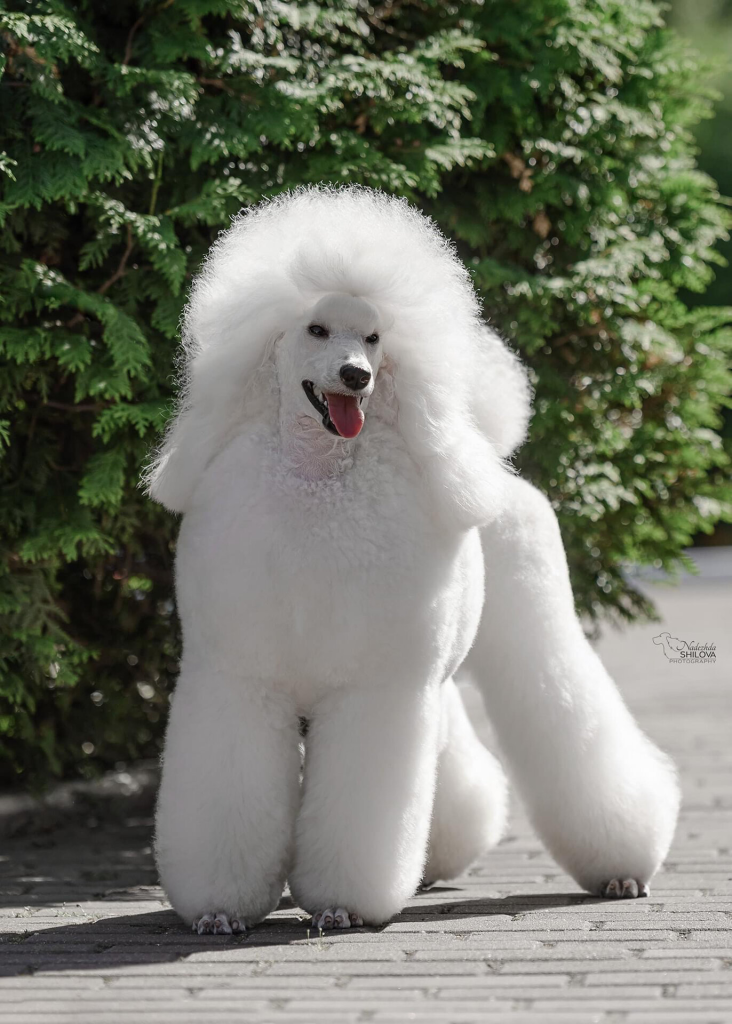
Did you know that Poodles were once war heroes, circus stars, and even fashion trendsetters for Marie Antoinette? These curly-coated marvels are far more than their glamorous reputation suggests. Buckle up as we unravel the hidden world of Poodles—from their medieval hunting roots to modern-day celebrity obsessions.
1. Anatomy of a Poodle: Names, Sizes, and Signature Traits
Names & Origins
- Official Name: Poodle (AKC-recognized).
- Aliases: Caniche (French, meaning “duck dog”), Pudel (German for “splash”), “the Aristopaw.”
- Controversial Origin: Despite their French fame, Poodles were bred in Germany around the 15th century as water retrievers.
Size Spectrum
Poodles come in three sizes, each with distinct traits:
- Toy Poodle: Under 10 inches tall, weighing 4–6 pounds—ideal for apartment living.
- Miniature Poodle: 10–15 inches, 10–15 pounds—the “Goldilocks” size for families.
- Standard Poodle: Towering over 15 inches, 45–70 pounds—the original athletic breed built for endurance.
Fun Fact: Standards are the only size classified as “working dogs” by the AKC.
Physical Features
- Tail: Historically docked to avoid injuries during hunting; modern Poodles often sport a natural, plume-like tail.
- Eyes: Dark, almond-shaped, and radiating alertness—“windows to their genius,” as trainer Victoria Stilwell notes.
- Ears: Long, leathers covered in velvety curls, hanging close to the head.
- Coat:
- Colors: 10+ shades, including black, white, apricot, red, silver, and rare “phantom” (multi-tone) patterns.
- Texture: Tight, hypoallergenic curls that grow continuously—similar to human hair—making them ideal for allergy sufferers.
Lifespan: 12–15 years (Toys often live longer, with some reaching 18 years).
2. Personality Deep Dive: The Einstein of Dogs
Poodles aren’t just smart—they’re “borderline psychic,” according to canine psychologist Dr. Stanley Coren, who ranks them as the 2nd most intelligent breed (after Border Collies). Here’s why:
- Problem-Solving Prowess: They can learn up to 200 commands and even mimic human behaviors (e.g., opening doors).
- Emotional Intelligence: They sense moods and adapt—cheerful clowns when you’re happy, intuitive comforters when you’re sad.
- Playfulness: Obsessed with games like fetch, agility courses, and hide-and-seek.
But Beware: Their brilliance has a dark side. Bored Poodles may:
- Rearrange your furniture.
- Mastermind escapes from yards.
- Develop anxiety if left alone too long.
Pro Tip: Mental stimulation > physical exercise. Rotate puzzle toys weekly!
3. A Journey Through Time: From Swamps to Palaces
Medieval Germany: The Duck Hunter
Poodles’ water-resistant coats and webbed feet made them elite retrievers. Hunters shaved their hindquarters for swimming efficiency, leaving puffs of fur to protect joints and vital organs—a practice that evolved into today’s show clips.
Renaissance France: The Royal Muse
French nobles hijacked the breed in the 1700s, turning them into status symbols. Marie Antoinette popularized the “lion clip,” while circus Poodles danced in tutus.
20th Century: War Heroes & Pop Culture Icons
- WWI & WWII: Poodles delivered messages and detected mines.
- Hollywood: From Elvis Presley’s puffball “Honey” to Lady Gaga’s trio of Frenchies, Poodles dominate celebrity laps.
Did You Know? A Standard Poodle named “Ch. Surrey Spice Girl” won Westminster in 2002—proving brains and beauty coexist!
4. Health Risks: What Every Owner Must Know
Common Genetic Issues
- Hip Dysplasia: Affects 18% of Standards. Keep weight at 45–60 lbs to reduce risk.
- Addison’s Disease: A hormonal disorder causing lethargy; requires lifelong medication.
- Progressive Retinal Atrophy (PRA): Genetic blindness; DNA tests can identify carriers.
Prevention Strategies
- Diet: High-quality protein, omega-3s for coat health, and glucosamine for joints.
- Exercise: 30–60 minutes daily to prevent obesity (a key trigger for joint issues).
- Vet Checks: Biannual exams for seniors; annual bloodwork to catch Addison’s early.
Quote: “Poodles thrive on routine—consistency in diet and exercise is non-negotiable,” warns Dr. Karen Becker, holistic veterinarian.
5. Grooming Masterclass: Beyond the Pom-Poms
Daily Care
- Brushing: Use a slicker brush + metal comb every 48 hours to prevent mats.
- Eyes & Ears: Wipe daily with vet-approved solutions to avoid infections.
Professional Grooming
- Classic Cuts:
- Continental Clip: Shaved hindquarters with pom-poms (the OG hunting style).
- Puppy Clip: Even length for a fluffy, youthful look.
- Bathing: Every 3 weeks with sulfate-free shampoo to retain natural oils.
DIY Hack: Apply cornstarch to dirty paws before washing—it absorbs grime!
6. Who Should Own a Poodle? The Perfect Match
Ideal Owners
- Active Families: Love hiking? Standards will outwalk you.
- City Dwellers: Toys and Minis adapt to apartments.
- Allergy Sufferers: Their low-shedding coats reduce sneezes.
Think Twice If
- You’re rarely home (separation anxiety is real).
- You dislike grooming (budget $80–$120/month for professional care).
7. Training Tips: Unlocking Their Potential
- Start Early: Socialize puppies with dogs, kids, and loud noises.
- Positive Reinforcement: They’re sensitive—yelling backfires. Use treats + praise.
- Advanced Tricks: Teach “clean up toys” or “fetch the remote” to challenge their minds.
Case Study: A Toy Poodle named “Chaser” learned 1,022 nouns—proof of their limitless potential!
FAQ: Poodle Mysteries Solved
Q: Are Poodles aggressive?
A: Rarely! They’re people-pleasers but may bark at strangers—early socialization is key.
Q: Why do Poodles shiver?
A: Excitement, not fear! They “vibrate” when happy (or cold—sweaters recommended in winter).
Q: Can they live with cats?
A: Yes! Their gentle nature suits multi-pet homes.
Q: Do they smell?
A: No! Their low-dander coats stay fresh longer than most breeds.
Conclusion: Why Poodles Rule the World
From duck marshes to red carpets, Poodles have conquered every role with wit, grace, and resilience. Whether you’re drawn to their hypoallergenic coats, their genius IQ, or their hilarious antics, one thing’s certain: Life with a Poodle is never boring. Ready to embrace the chaos (and the curls)?